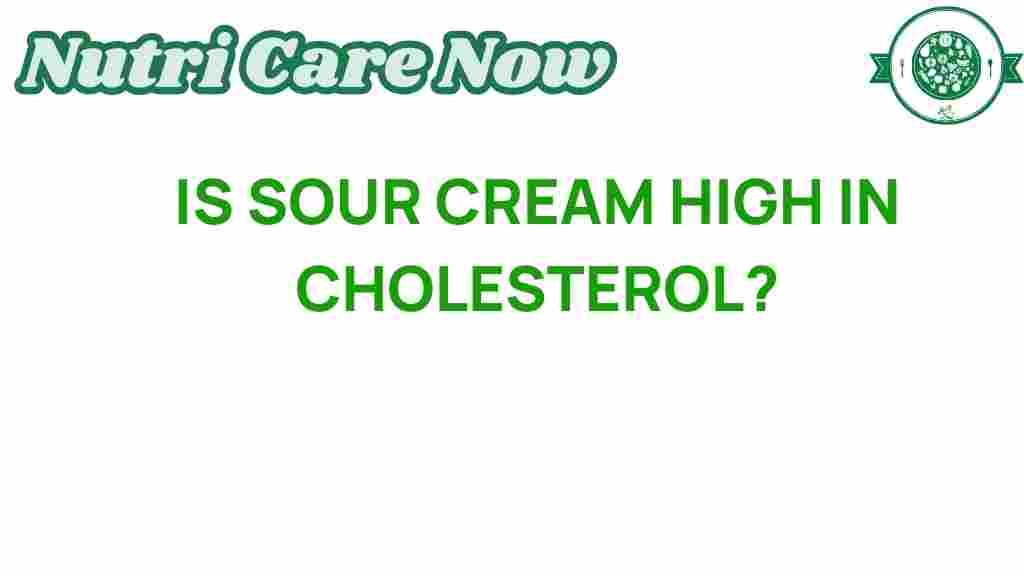Unraveling the Truth: Is Sour Cream High in Cholesterol?
Sour cream is a popular ingredient in many cuisines, known for its creamy texture and tangy flavor. It enhances dishes ranging from baked potatoes to tacos and is a staple in many households. However, there is a common concern among health-conscious individuals regarding the cholesterol content in sour cream and its potential impact on heart health. In this article, we will delve into the nutrition facts of sour cream, explore its relationship with dietary fats, and discuss any health risks associated with its consumption. Let’s unravel the truth about sour cream and cholesterol.
Understanding Cholesterol
Before we dive into the specifics of sour cream, it’s essential to understand what cholesterol is and why it matters. Cholesterol is a waxy substance found in your blood that is necessary for building healthy cells. However, too much cholesterol can lead to health problems, particularly in relation to heart health.
- LDL Cholesterol: Often referred to as “bad” cholesterol, high levels of LDL can lead to plaque buildup in arteries, increasing the risk of heart disease.
- HDL Cholesterol: Known as “good” cholesterol, HDL helps remove LDL cholesterol from the bloodstream.
Dietary choices play a crucial role in managing cholesterol levels, making it vital to understand the nutritional components of foods like sour cream.
Nutritional Profile of Sour Cream
To assess whether sour cream is high in cholesterol, we must look at its nutrition facts. A typical serving size of sour cream (2 tablespoons) contains:
- Calories: 60
- Total Fat: 5g
- Saturated Fat: 3g
- Cholesterol: 15mg
- Sodium: 15mg
- Carbohydrates: 1g
- Protein: 1g
From this breakdown, we can see that sour cream does contain a moderate amount of fat and cholesterol, particularly saturated fat, which can influence cholesterol levels in the body.
Sour Cream and Dietary Fats
Sour cream is primarily composed of fats, and understanding these fats is crucial when evaluating its health implications. Here’s how the fats in sour cream break down:
- Saturated Fats: The majority of fat in sour cream is saturated fat. Consuming saturated fats in excess has been linked to increased levels of LDL cholesterol.
- Unsaturated Fats: Sour cream contains small amounts of unsaturated fats, which are considered heart-healthy.
Health Risks Associated with High Cholesterol
High levels of cholesterol, especially LDL cholesterol, can lead to various health risks, including:
- Heart Disease
- Stroke
- High Blood Pressure
- Atherosclerosis (hardening of the arteries)
Therefore, individuals with existing heart conditions or those at risk should be cautious about their intake of foods high in saturated fats and cholesterol, including sour cream.
Making Healthier Food Choices
So, should you avoid sour cream altogether? Not necessarily. Moderation is key. Here are some tips for incorporating sour cream into your diet while managing cholesterol levels:
- Opt for Low-Fat or Non-Fat Versions: These alternatives often have lower cholesterol content and fewer calories.
- Use in Moderation: Limit the amount you use in recipes or as a topping.
- Balance with Other Foods: Pair sour cream with healthier ingredients like vegetables or whole grains to create a balanced meal.
Alternatives to Sour Cream
If you are concerned about the cholesterol content in sour cream, there are several alternatives you can consider:
- Greek Yogurt: A popular substitute that is lower in fat and high in protein.
- Cottage Cheese: Offers a similar texture and can be used in many recipes.
- Avocado: For a creamy texture, mashed avocado can be a healthy alternative.
These alternatives can help you reduce saturated fat and cholesterol intake while still enjoying creamy dishes.
Conclusion
In summary, while sour cream does contain cholesterol and saturated fats, it can be enjoyed in moderation as part of a balanced diet. Understanding the nutrition facts and the role of dietary fats is crucial for making informed food choices that support heart health. Remember to balance your intake of sour cream with healthier options and maintain a diet rich in fruits, vegetables, whole grains, and lean proteins.
For more information on managing cholesterol through diet, check out this resource. If you’re looking for delicious recipes that incorporate sour cream in a heart-healthy way, visit our recipe section.
Ultimately, it’s about finding the right balance in your diet and making choices that align with your health goals. Enjoy your sour cream, but be mindful of how it fits into your overall dietary plan.
This article is in the category Health and created by NutriCareNow Team

2 thoughts on “Unraveling the Truth: Is Sour Cream High in Cholesterol?”